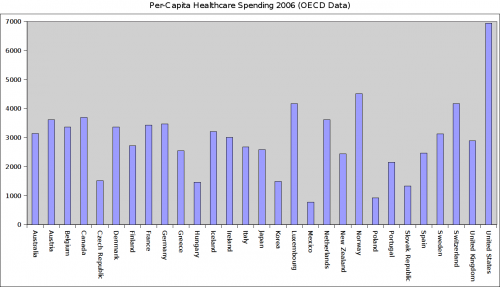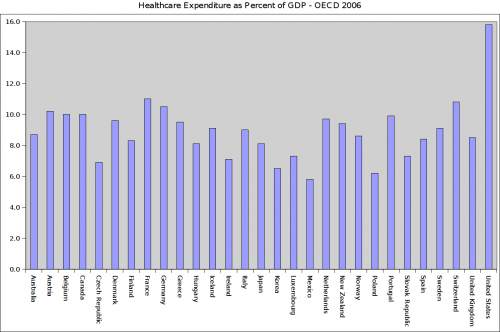Archive (2009)
Evening News
Mon, 08/24/2009 - 20:14 — RottenchesterMassa and Schumer are asking again for disaster money for CattCo.
Jill Wynn of the D&C editorial board has a post about Massa's town hall meetings. I thought this was an interesting way to put it:
I received this information below via e-mail Friday afternoon from the Organizing for America folks regarding town hall meeting to discuss healthcare reform in our area. These meetings will be held by Rep. Eric Massa.
Since Massa is the only federal office holder hosting open town hall meetings, I wonder how many Rochester-area voters will use his meetings as an opportunity to learn or protest, even if they don't live in the 29th.
No-Spin Healthcare Facts
Mon, 08/24/2009 - 09:20 — RottenchesterI've heard a lot of noise about numbers in the healthcare debate. People are uncomfortable with the claim that we spend far more than any other country, and with the claim that the quality of our healthcare trails other countries. So, this weekend I went looking for reliable sources for those two claims.
 First, spending, which is the easy one. An organization called the Organization for Economic Cooperation and Development (OECD) has been compiling data on healthcare spending for years. Their latest report shows that the US spends significantly more than other developed countries, no matter how you slice it. The graph above uses 2006 OECD data, which is the latest full set available. As you can see, we spent about $7,000 per person on healthcare that year, far more than other developed countries.
First, spending, which is the easy one. An organization called the Organization for Economic Cooperation and Development (OECD) has been compiling data on healthcare spending for years. Their latest report shows that the US spends significantly more than other developed countries, no matter how you slice it. The graph above uses 2006 OECD data, which is the latest full set available. As you can see, we spent about $7,000 per person on healthcare that year, far more than other developed countries.
 One of the talking points I've heard is that per-capita numbers don't tell the whole story, because they don't count illegal immigrants. The graph above, based on the same OECD data, that shows spending as percentage of GDP. We still spend the most by a longshot using GDP as the benchmark. (Note that you can click on either graph to enlarge it.)
One of the talking points I've heard is that per-capita numbers don't tell the whole story, because they don't count illegal immigrants. The graph above, based on the same OECD data, that shows spending as percentage of GDP. We still spend the most by a longshot using GDP as the benchmark. (Note that you can click on either graph to enlarge it.)
The second claim -- that the quality of our healthcare isn't as good as the rest of the world -- is harder to measure. The non-partisan Robert Wood Johnson foundation has sponsored a comprehensive analysis of the existing reports on healthcare quality. The full report is a dozen pages and cites a number of different studies. Here are some findings:
- The US is "one of several world leaders" in cancer care.
- US-Canada comparisons more often find that Canadian care is better overall.
- The US has more surgical and medical errors (known as "patient safety" issues) than other countries.
The report specifically debunks one talking point: that the higher US rate of homicide and violent death skews mortality statistics. The study authors looked at "amenable mortality", which adjusts for different accident rates, and found that the US still lags other countries.
Overall, the study found:
[W]hile evidence base is incomplete and suffers from other limitations, it does not provide support for the oft-repeated claim that the “U.S. health care is the best in the world.” In fact, there is no hard evidence that identifies particular areas in which U.S. health care quality is truly exceptional.
Leader Op-Ed and Dunning Column
Sun, 08/23/2009 - 12:02 — RottenchesterReader Elmer sends today's Corning Leader Opinion Page [pdf], which contains Eric Massa's op-ed explaining his position on listening to constituents.
Editor Joe Dunning's column also discusses the healthcare issue, making the point that doing something is probably better than doing nothing.
Reed on the Issues
Sun, 08/23/2009 - 08:35 — RottenchesterTom Reed's campaign site has now posted its "issues" page, which contains a short run-down of Reed's positions on eight issues of the day.
Since healthcare is driving our current discussion, it's interesting to take a closer look at Reed's statement. He begins with this:
The current proposal, HR 3200, has been changed a number of times and likely will change many more times. At this point, the debate is not about the specifics of HR 3200. It’s about private care vs. socialized medicine.
He goes on to point out that Massa is in favor of single-payer healthcare, and Reed isn't. Fair enough, though even Massa agrees that single-payer is off the table. Reed wants the debate to be about socialized medicine, but it isn't -- it's about the way that the market for private insurance should be structured, and whether that market should include a public option to ensure competition.
Reed ends with :
We should subject health insurance to competition in the free market. Instead of being forced into a particular plan by their employer, people should be able to choose. Choose their own plan that allows them to work with their doctors, not a government board, to determine what treatments are necessary and when.
Allowing patients to choose health plans in an open market will force health insurance companies, healthcare providers and pharmaceutical companies to compete by offering plans, services and products based on market needs and demand. Free market competition will inevitably drive costs down.
Am I missing something here? Hasn't the free market led to rescission and denial of coverage for pre-existing conditions? How will Reed address that? Though HR 3200 contains no "government board" to determine treatment, why is it better to have an insurance company board making decisions, as they do today?
Also, even though employees can't choose their insurance, employers who purchase insurance can probably strike a better bargain, because they have the bargaining power of purchasing a good in volume. Xerox gets a better price from GM for fleet trucks than I do because they're buying thousands rather than one, and the same is true of insurance.
It's good that Reed is engaging on healthcare instead of just saying "No", but we need more meat on this topic.
Morning News
Sun, 08/23/2009 - 08:15 — RottenchesterThe Messenger-Post's Saturday editorial supports Massa's remarks at Netroots nation, saying:
Should Massa listen to his constituents on the subject of health care? Yes, and he has — most visibly through town hall meetings that have attracted hundreds at a time. Should he pander to popular opinion — or any opinion, for that matter — when it comes time to the vote? No.
In the end, Massa should be trusted to draw on his research on the health-care issue and make an informed decision. That’s what he, and other politicians, were elected for. And informed decisions sometimes run counter to public opinion.
The YouTube of Massa's remarks has provoked an avalanche of negative posts in out-of-district right-wing blogs. In the district, however, one of the most conservative papers (the Leader) and one of the most liberal (the Messenger-Post) have a completely different take.
The D&C has a long story about Rochester-area town hall meetings. The story concentrates on Massa's meetings, since Maffei, Lee and Slaughter are having nothingburger phone-in meetings.
Massa Endorses Gillibrand
Fri, 08/21/2009 - 21:31 — RottenchesterJoe Spector has Massa's announcement that he's endorsing Kirsten Gillibrand for Senate. It looks like Gillibrand won't have any primary opposition, so her spot as the Democrat in the race is sealed.
Need To Know
Fri, 08/21/2009 - 21:00 — RottenchesterI'm late to the party on this one, but Need to Know, WXXI's public affairs program featured Eric Massa this evening at 8:30. The show will re-air Sunday at 12:30, and will also be available via the website.
Massa Lovefest at the Leader, Evening Trib
Fri, 08/21/2009 - 13:42 — RottenchesterReader Elmer sent today's Corning Leader editorial [pdf] about Eric Massa's performance. The Leader's editorial writer isn't overly concerned with Massa's statement at Netroots Nation, and the Leader concludes that Massa was doing what he was elected to do. Leader columnist Bob Rolfe also has a positive column on Massa.
The Massa press office also sent Andy Thompson's column in the Hornell Evening Tribune [pdf]. Thompson lauds Massa's hard work, but wonders if the Netroots Nation remarks will come back to bite him.
Noon Report
Thu, 08/20/2009 - 12:26 — RottenchesterThe Massa campaign has an email out pointing to this YouTube of Massa's appearance on Fox, where he's grilled about his comments at Netroots Nation.
The USDA has published a new report on rural broadband.
Wage and salary jobs, as well as number of proprietors, grew faster in counties with early broadband Internet access," the survey concludes. "Nonfarm earnings showed greater growth corresponding to broadband availability."
The link has maps that are colored corresponding to the amount of access available. The rural Southern Tier is pretty lightly covered.
Morning News
Thu, 08/20/2009 - 08:06 — RottenchesterHere's the Olean Times-Herald's take on Massa's Tuesday press conference.
The Buffalo News praises Massa for holding town hall meetings.
Polls and Representative Democracy
Wed, 08/19/2009 - 20:48 — RottenchesterIn reading through the comments on newspaper sites in the district, I see a lot of remarks to the effect that Eric Massa isn't listening to his constituents at town hall meetings, that he's holding positions contrary to his constituents, and that he represents a small minority in the district.
The obvious counterargument to these commenters is that this a representative democracy, and that the last accurate poll taken in the district was in November, 2008, when Massa was elected. But let's forget that for a moment and find out what polls can tell us.
The latest Wall Street Journal/NBC News Poll says that 36% of Americans think Barack Obama's health plan is a good idea. However, once respondents are read a one-paragraph description of Obama's plan, 53% of them approve of it. Here's the paragraph:
The plan requires that health insurance companies cover people with pre-existing medical conditions. It also requires all but the smallest employers to provide health coverage for their employees, or pay a percentage of their payroll to help fund coverage for the uninsured. Families and individuals with lower- and middle-incomes would receive tax credits to help them afford insurance coverage. Some of the funding for this plan would come from raising taxes on wealthier Americans.
We've heard a lot of talk about socialism and death panels, and the reason is clear: once people hear the modest reforms that are actually contained in the healthcare bill, they think it's sensible. I don't know if 53% is the number in the 29th, but the notion that a vast majority of 29th residents oppose Obama's healthcare reform is simply ludicrous.
Olean Town Hall
Wed, 08/19/2009 - 20:10 — RottenchesterThe Buffalo News has a report from the Olean town hall meeting that happened on Sunday. They peg attendance at 300, and note that Massa was loudly booed when he said that "the health care system is broken due to problems with high cost and lack of access."
The Olean Times-Herald also has a story on the meeting.